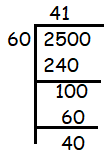QUESTIONS ON PRIME FACTORIZATION
Subscribe to our ▶️ YouTube channel 🔴 for the latest videos, updates, and tips.
What is a prime factorization of a number?
Expressing a given number as a product of factors that are all prime numbers is called the prime factorization of a number.
To write a number as a product of its prime factors, we follow these steps.
Step 1 :
Decompose the given number into prime factors by division method.
Step 2 :
Write all the prime factors as a product. If the same prime factor is repeated, use exponential form to express the factors.
Write the prime factorization of the number:
Problem 1 :
20
Solution :
Decompose 20 into prime factors,

20 = 2 x 2 x 5
Writing the repeating factors in exponential form, we get
= 22 x 5
Problem 2 :
72
Solution :

72 = 2 x 2 x 2 x 3 x 3
Here 2 is repeating two times and 3 is repeating three times. Writing the repeating factors in exponential form, we get
72 = 23 x 32
Problem 3 :
68
Solution :

68 = 2 x 2 x 17
Here 2 is repeating two times. Writing the repeating factors in exponential form, we get
68 = 22 x 17
Problem 4 :
55
Solution :

55 = 5 x 11
Here no factor is repeating, so no need to use exponential form.
Problem 5 :
30
Solution :

30 = 2 x 5 x 3
Here there is no repeating factor, so no need to use the exponential form.
Problem 6 :
74
Solution :

Here 37 is prime number, so we stop the process here itself.
74 = 2 x 37
Problem 7 :
105
Solution :

105 = 5 x 3 x 7
There is no repeating factor.
Problem 8 :
108
Solution :

108 = 2 x 2 x 3 x 3 x 3
Here 2 is repeating two times and 3 is repeating three times.
108 = 22 x 33
Problem 9 :
90
Solution :

90 = 2 x 5 x 3 x 3
= 2 x 5 x 32
Problem 10 :
198
Solution :

198 = 2 x 3 x 3 x 11
Here 3 is repeating two times. So,
= 2 x 32 x 11
Problem 11 :
Which number is a prime factor of 572?
a) 4 b) 7 c) 13 d) 22
Solution :
572 = 2 x 2 x 11 x 13
Writitng in exponential form, we get
= 22 x 11 x 13
2, 11 and 13 are prime factors. Accordingly options given, option c is correct.
Problem 12 :
What is the prime factorization of 1100?
Solution :
1100 = 11 x 100
= 11 x 2 x 2 x 5 x 5
= 11 x 22 x 52
So, the prime factorization of 1100 is 11 x 22 x 52.
Problem 13 :
Which of the following is pair of co-primes?
a) (16, 62) b) (18, 25) c) (21, 35) d) (23, 92)
Solution :
Option a :
(16, 62)
16 is composite number
62 is also composite number
16 = 24
62 = 2 x 31
Highest common factor of 16 and 62 is 2. Since the highest common factor is not 1, these are not co-primes.
Option b :
(18, 25)
18 is composite number
25 is also composite number
18 = 2 x 3 x 3
= 2 x 32
25 = 5 x 5
= 52
Highest common factor of 18 and 25 is 1. So, these are co-primes.
Problem 14 :
The greatest number of four digits which is divisible by 15, 25, 40 and 75.
a) 9000 b) 9400 c) 9600 d) 9800
Solution :
15 = 3 x 5
25 = 5 x 5 ==> 52
40 = 2 x 2 x 2 x 5
= 23 x 5
75 = 5 x 5 x 3
= 52 x 3
To find the number which is divisible by the numbers 15, 25, 40 and 75 must be a highest common factor.
highest common factor = 3 x 52 x 23
= 600
Multiples of 600 are also divisble by the given numbers.
600, 1200, 1800, 2400, ............9600
So, option c is correct.
Problem 15 :
The least number should be added to 2497 so that the sum is exactly divisible by 5, 6, 4 and 3 is
a) 3 b) 13 c) 23 d) 33
Solution :
If the number should be divisible by 5, 6, 4 and 3, then it must be multiple of all these numbers. By finding the least number which is multiple of 5, 6, 4 and 3.
6 = 2 x 3
4 = 22
least common multiple = 22 x 3 x 5
= 60
Multiples of 60 are also divisible by 5, 6, 4 and 3.
60, 120, 180, ...........

2500 - 40 = 2460
2460, 2520, ..............
2497 - 2520 ==> 23
So, option c is the number should be added to 2497.
Subscribe to our ▶️ YouTube channel 🔴 for the latest videos, updates, and tips.
Recent Articles
-
Finding Range of Values Inequality Problems
May 21, 24 08:51 PM
Finding Range of Values Inequality Problems -
Solving Two Step Inequality Word Problems
May 21, 24 08:51 AM
Solving Two Step Inequality Word Problems -
Exponential Function Context and Data Modeling
May 20, 24 10:45 PM
Exponential Function Context and Data Modeling